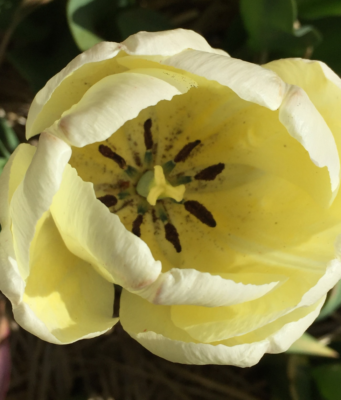I love going to homesteading events. I attended the annual Mt. Vernon Herb and Gardening Show held in the frigid depth of winter. I didn’t encounter many innovations but rather had several of my techniques and methods affirmed as going in the right direction. I did get a surprise while attending a seminar on composting. It had nothing to do with compost, instead, it was a truth about all knowledge in general and homesteading. He stated that there was nothing new concerning homesteading, but that often the “tried and true” method falls out of fashion and older skills been set aside and unfortunately lost.
He told a story of how the national officials of the Netherlands had flown him over to consult them on a fungus issue that they had been battling for years. The growers of the Holland bulbs were dealing with a fungus that caused them to drench the fields with chemicals. The government of the Netherlands passed a law whereby the growers had to reduce the use of all herbicides by 75% within a year. That’s why this organic specialist had been called in to try to fix the problem.
As he examined the fields of tulips, he observed that they all had one thing in common, a series of gates and dikes that surrounded each field. When he asked the growers, what purpose the gates served they answered that before herbicides, the previous generations of growers had opened the gates in late winter and flooded each field. The sea water acted as a natural deterrent to prevent the fungus and diseases for which the present growers were soaking their fields in chemicals. In spring, they drained the area, and no fungus plagued the crop. But it was less labor intensive to apply the herbicide than to open and close the gates physically.
The funny part of his story was that it took him quite some time to get them to see the natural solution to their problem. When they finally had an epiphany, they were thrilled to have such a simple answer to their dilemma. He was rewarded with over 1,000 premium Holland bulbs the next fall when the forgotten technique worked like a charm.

I marveled at this story and thought about it for days following the seminar. How many life skills and lost arts are slipping away from the next generation? For example the excellent clobber/leatherworker we have been using for 30 years, trained up his son in his craft, but his son could not make enough money to sustain his family and left to work in a factory. The waiting list is over six months to have something repaired by this craftsman. When he retires, who will know the art of fixing the stitching on that expensive leather purse or how to re-sole your favorite boots?
Rather than staying in the “mulligrubs” and fretting about it, I have strengthened my resolve to be part of the solution. I am blessed to partner with a company that is sincere in their desire to help the next generation learn the skill-sets and crafts that enrich our lives. Learning a new skill set is like adding treasure to your storehouse of knowledge.
Enjoy today! Sincerely here to help. Ann May






